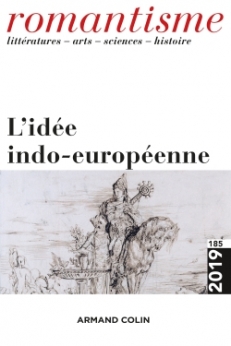
Romantisme n°185 (3/2019)
Pour acheter ce numéro, contactez-nous
Recevez les numéros de l'année en cours et accédez à l'intégralité des articles en ligne.
Les travaux d’Eugène Burnouf (1801-1852) révèlent que le comparatisme indo-européen a pu s’inscrire dans une perspective universaliste et servir la conception révolutionnaire d’une humanité prométhéenne créant, par elle-même, ses langues et ses dieux. En se situant dans la tradition intellectuelle du sens commun puisé chez un Vico interprété par Michelet, Burnouf considère que les textes sanscrits et « zends » offrent une voie d’accès privilégiée à l’histoire primitive de l’esprit humain, sans qu’il y ait pour autant affirmation d’une identité indo-européenne spécifique. Cette ressource conceptuelle, politiquement située, sous la Restauration, dans le camp libéral, permet de faire un usage révolutionnaire de la philologie indo-européenne opposé à son usage contre-révolutionnaire, heurtant ainsi de front les tenants du traditionalisme catholique.
The work of Eugène Burnouf (1801–1852) reveals that Indo-European comparatism was able to function within a universalist perspective and serve the revolutionary conception of a Promethean humanity creating from within itself its languages and its gods. In positioning himself within the tradition of sens commun as inherited form Vico interpreted by Michelet, Burnouf considers that Sanskrit and « Zend » texts allow privileged access to the primitive history of the human mind, without a specific Indo-European identity per se. This resourceful concept, whose politics, during the Restauration, are liberal, allows for a revolutionary use of philology as opposed to a counter-revolutionary one, in a position directly at odds with traditional Catholic hold-outs.

